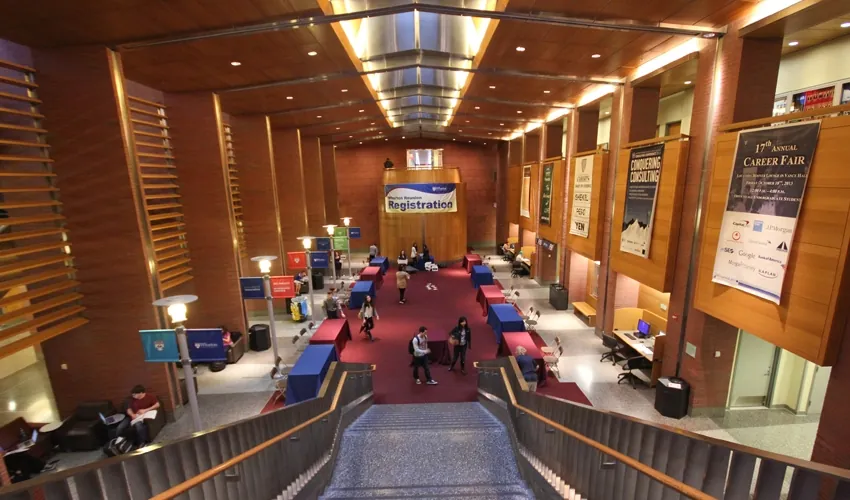
It’s hard to believe that it has been an entire year since students made the abrupt shift to remote learning. I have been fortunate enough to live on campus this school year – and many of my peers at Penn have been able to do the same. However, I personally have not had any in-person instruction since COVID hit and I am itching to get back to normal.
When your bedroom is your classroom, some things are easier than others. Don’t get me wrong, I love knowing that I can roll out of bed 5 minutes before class and still be on time. Still, I realize now how much I took for granted: the hectic walk to Huntsman Hall every morning; the buzz of my fellow students on Locust Walk; and the opportunity to soak up the energy from a room filled with the most driven, intelligent, and creative people I have ever met.
That being said, I must say the transition to online learning at Wharton has been very smooth all things considered. Like everyone, though, I have had my fair share of struggles adjusting over the past year. Now, with a year of virtual learning under my belt, there are a few key factors that have allowed me to be able to thrive in this new learning environment:
1) COLLABORATION
Over the past two semesters, feeling engaged and connected to my classmates has been a huge challenge I’ve faced in my academics. While living on campus has been a drastic improvement from last spring, I’ve found that feelings of connectedness still come much easier with a physical presence in an actual classroom.
The school’s collaborative and supportive structure has always been my favorite aspect of Wharton. In my three years here, I have yet to take a single class that did not encourage a large amount of group work. Luckily that collaborative culture has persisted throughout the past year and has been the savior to my academic experience.

Ana Singhal
A lack of motivation to do some tasks – and to do them well – has been a struggle I think we’ve all experienced to some degree during the pandemic. In response to the shift to virtual learning, many of my professors have opted to give fewer exams and create more projects. This has been incredibly beneficial to the learning experiences for myself and my peers. The emphasis on group work at Wharton has allowed me to feel connected to my classmates. It has been immensely helpful to be able to collaborate with people who push me to think smarter, harder, and differently when working on assignments. Working on assignments alone, I’m much more likely to submit work that I feel is “good enough” – even if I am not 100% confident in the final product. Nothing helps me learn more than having my group members question my logic, assumptions, and train of thought, particularly when doing tasks like building models in my Finance classes or coding in my Business Analytics coursework.
In addition to collaboration on tasks outside of class, virtual learning has actually enhanced my experience of collaboration during class sessions themselves relative to my pre-COVID classes. The use of breakout rooms during classes has allowed me to interact with classmates whom I might not have in an in-person setting. We now live in a world where there is much less accountability during class and my attention tends to drift more. Additionally, this structured peer interaction in breakouts rooms has helped to keep me engaged in class.
2) ROUTINE
In a world where you don’t even have to leave bed or even show your face in class, it can be easy to spiral into a lack of productivity. For me, forming some semblance of a routine and having structure in my day has been everything.
I have tried my best to generally emulate a pre-COVID-like structure to my day: class in the morning, work in the afternoon, and meetings and time with my friends in the evening. On some days, I struggle to get going as a result of knowing I don’t have anywhere to be despite having countless things to do. On these days, I simply start my routine. I know that taking any action, even as small as brushing my teeth, is enough to motivate me to power through the rest of my to-do list.
Zoom fatigue is real though. I have found the best way for me to combat bouts of exhaustion and productivity lag is to schedule my breaks. Every day, I build in time for a coffee break, a walk with a friend, and a run. It helps me a lot to get outside and step away from screens. Otherwise I run the risk of either overworking myself or doing nothing at all. Taking a designated break not only refreshes and re-energizes me, it also helps me combat the problem of feeling like I have “unlimited time” to do things. This prevents me from drawing out tasks for too long and allows me to plan and budget my time more effectively.

The Wharton School at the University of Pennsylvania
3) BOUNDARIES
Before COVID, I was only really ever in my bedroom to sleep. You could find me in Huntsman Hall, the library, my favorite coffee shops, running by the Schuylkill, or out at dinner in Center City. Suddenly, my list of options for places to be besides my bedroom became much more limited. As a result, I knew I had to find a way to set up my environment for success.
I made sure each space of my room only served one use. My bed was for sleeping; my desk was for working; the kitchen was for eating; and the living room was for hanging out with my housemates. This kept me from falling into the trap of doing things like attending class in bed and never being able to escape feeling like I should be working all the time. Setting clear boundaries for my now-combined living and learning environment has been key to helping me avoid extremes when it comes to my productivity and stress levels.
4) SELF-COMPASSION
Even with collaboration, routine, and the boundaries I have set for myself, I am far from being my most efficient, productive self, day in and day out. Pre-COVID, I was never someone who took time to slow down. Last spring, I was definitely very hard on myself, constantly pushing myself to be just as, if not even more, motivated than my pre-pandemic self. I struggled to forgive myself for lapses in motivation.
Since last March, the most important thing I’ve learned is to forgive myself for a “bad” moment, day, or week and to have the confidence to know that I will always bounce back. Now, in moments when I am frustrated with myself, I have learned how important it is to take a step back and remember the reality of the situation we are all living in. I remind myself that while I may not be my pre-pandemic state, neither is the world at large. I remind myself to control what I can and be grateful for all of the things I have gained in the past year: time for reflection, self-improvement, strengthened relationships, and a great exercise in adaptability.
My name is Ana Singhal and I am a junior at the Wharton School from Columbus, Indiana. I have yet to decide on a concentration, but have particularly enjoyed studying Statistics, Marketing, and Health Care Management so far. On campus, I am involved in Wharton Ambassadors, Wharton Women, and am a research assistant. In my free time, I enjoy running and exploring Philly.











Questions about this article? Email us or leave a comment below.